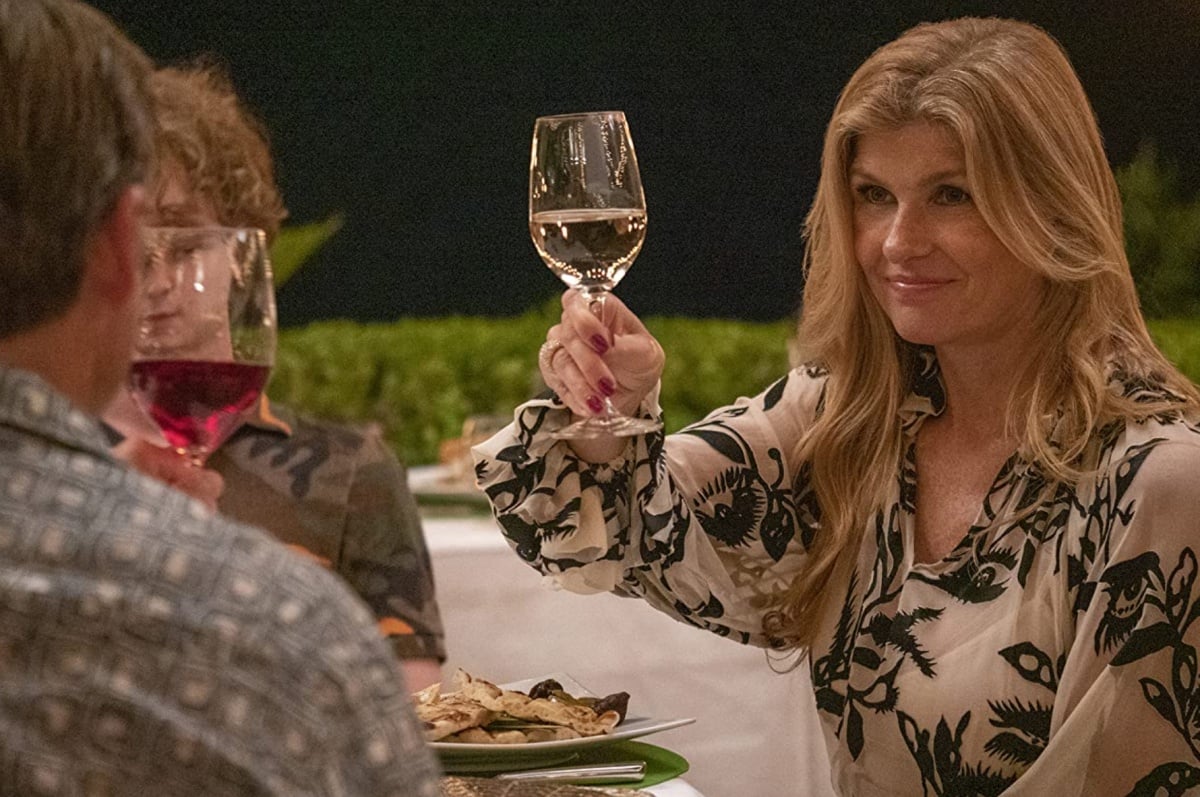The White Lotus is a show I was curious about when I saw the trailers—a group of mostly white rich people heading to a Hawai’ian resort. It is the kind of pandemic watching that feeds discourse on every level, and four episodes into a six-episode season, I have not been disappointed.
Our “guests” are made up of three groups:
The Mossbacher family is made up of Nicole (Connie Britton), Mark (Steve Zahn), Quinn (Fred Hechinger), Olivia (Sydney Sweeney), and Paula (Brittany O’Grady). Nicole is the CFO of a search engine, who is married to Mark, who arrives on the island with a lingering potential health crisis. Their son is Quinn, an awkward teen attached to his phone, and their daughter Olivia is a sophomore in college who brings her friend from school, Paula, on the trip.
A rich, liberal white family with their daughter’s token mixed-race friend, the dynamic we see here is generational. Olivia and Paula arrive with their show-off books (The Portable Nietzsche and The Complete Psychological Works of Sigmund Freud), but quickly we see how Olivia’s leftist politics clash against her mother’s Hilary Clinton liberalism. Paula, who is the only major character who is a person of color and a guest, is very much forced into a position of awkwardness, especially as she bonds with a local Hawai’ian guy named Kai.
Tanya McQuoid (Jennifer Coolidge) is a rich woman whose mother has just died. She clearly is dealing with some personal mental health issues but has no sense of boundaries. She ends up attaching to the character of Belinda (Natasha Rothwell), the spa manager at the resort. Without meaning to, Tanya had placed Belinda, a Black woman, into a caretaker role and infused her with ideas of opening her own business. While I am hopeful that it will go well, the reality is that their relationship is one-sided.
And then, we have Shane (Jake Lacy) and Rachel (Alexandra Daddario) Patton, the newlyweds. Shane is an absolute asshole who doesn’t listen to his wife, belittles her career accomplishments, and is quick to fall back on his mother’s money for everything. He spends the entire honeymoon complaining and telling Rachel not to work.
For the first three episodes, the native people of Hawai’i have been absent from the narrative. Paula’s relationship with Kai gives us access into what is going on there. Kai explains that the resort is built on land that once belonged to his family that was stolen from them illegally. His family has been fighting legal battles against it, but he also works there because he has to make a living.
This is not just a flavor text for a TV show. For years, public agencies had occupied thousands of acres of ancestral lands, paying, as ProPublica reports, “little or no compensation for decades as the sites were used for military bases, game preserves, schools and other purposes.” In 1995, state and federal legislation pledged to provide reparations. That has still not happened.
Over the years, the U.S. government has provided about 900 acres as compensation for its unauthorized takings. But none of the land conveyed, almost all of it on Oahu, was suitable for residential use, according to DHHL. And the federal government still owes additional land under the Hawaiian Home Lands Recovery Act.
“Justice delayed is justice denied,” said former Gov. John Waihee, the only Native Hawaiian to hold that office and whose administration was instrumental in negotiating the Act 14 bill. “At some point, you can’t keep putting things off.”
The White Lotus is timely in many ways as “American exceptionalism” is at the root of many issues we have about the pandemic we’re in—being one of the most vaccinated countries, having some of the most access to vaccines, and still not being responsible with that power.
Tourism is a part of the economy of Hawai’i, but it is also a place where people live. It is treated like paradise for guests, but at the cost of exoticizing a people. Even Paula, who comes in with her weed and drugs, around the stark whiteness of it all, cannot help but realize she has more in common with the Native people than the white family she came with.
How many of us are aware of the politics of the places we choose to vacation?
It is a painfully honest satire about the privilege of whiteness, and mainland Americanness, in a brown space, and I’m deeply interested in seeing how it continues.
(image: HBO)
Want more stories like this? Become a subscriber and support the site!
—The Mary Sue has a strict comment policy that forbids, but is not limited to, personal insults toward anyone, hate speech, and trolling.—










Published: Aug 4, 2021 10:19 PM UTC